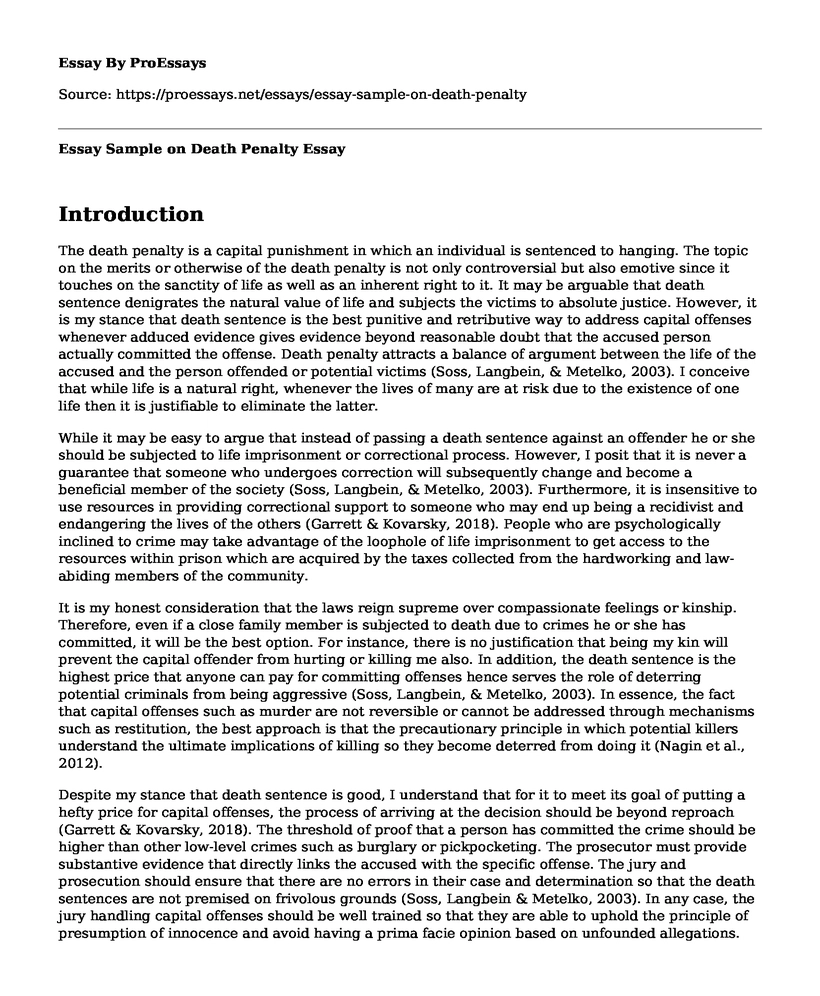Introduction
The death penalty is a capital punishment in which an individual is sentenced to hanging. The topic on the merits or otherwise of the death penalty is not only controversial but also emotive since it touches on the sanctity of life as well as an inherent right to it. It may be arguable that death sentence denigrates the natural value of life and subjects the victims to absolute justice. However, it is my stance that death sentence is the best punitive and retributive way to address capital offenses whenever adduced evidence gives evidence beyond reasonable doubt that the accused person actually committed the offense. Death penalty attracts a balance of argument between the life of the accused and the person offended or potential victims (Soss, Langbein, & Metelko, 2003). I conceive that while life is a natural right, whenever the lives of many are at risk due to the existence of one life then it is justifiable to eliminate the latter.
While it may be easy to argue that instead of passing a death sentence against an offender he or she should be subjected to life imprisonment or correctional process. However, I posit that it is never a guarantee that someone who undergoes correction will subsequently change and become a beneficial member of the society (Soss, Langbein, & Metelko, 2003). Furthermore, it is insensitive to use resources in providing correctional support to someone who may end up being a recidivist and endangering the lives of the others (Garrett & Kovarsky, 2018). People who are psychologically inclined to crime may take advantage of the loophole of life imprisonment to get access to the resources within prison which are acquired by the taxes collected from the hardworking and law-abiding members of the community.
It is my honest consideration that the laws reign supreme over compassionate feelings or kinship. Therefore, even if a close family member is subjected to death due to crimes he or she has committed, it will be the best option. For instance, there is no justification that being my kin will prevent the capital offender from hurting or killing me also. In addition, the death sentence is the highest price that anyone can pay for committing offenses hence serves the role of deterring potential criminals from being aggressive (Soss, Langbein, & Metelko, 2003). In essence, the fact that capital offenses such as murder are not reversible or cannot be addressed through mechanisms such as restitution, the best approach is that the precautionary principle in which potential killers understand the ultimate implications of killing so they become deterred from doing it (Nagin et al., 2012).
Despite my stance that death sentence is good, I understand that for it to meet its goal of putting a hefty price for capital offenses, the process of arriving at the decision should be beyond reproach (Garrett & Kovarsky, 2018). The threshold of proof that a person has committed the crime should be higher than other low-level crimes such as burglary or pickpocketing. The prosecutor must provide substantive evidence that directly links the accused with the specific offense. The jury and prosecution should ensure that there are no errors in their case and determination so that the death sentences are not premised on frivolous grounds (Soss, Langbein & Metelko, 2003). In any case, the jury handling capital offenses should be well trained so that they are able to uphold the principle of presumption of innocence and avoid having a prima facie opinion based on unfounded allegations.
Conclusion
In conclusion, I support the death sentence even if it was to be applied on my relative. The underlying reason for this is that someone who kills can as well kill me and that the death sentence makes the perpetrators pay the ultimate price for their actions as well as deter people who may commit the same crimes. Nonetheless, due process supported by indisputable evidence presented to a competent jury should inform whether an individual should be killed or not.
References
Soss, J., Langbein, L., & Metelko, A. R. (2003). Why do white Americans support the death penalty? Journal of Politics, 65(2), 397-421. https://www.jstor.org/stable/10.1111/1468-2508.t01-2-00006.
Garrett, B., & Kovarsky, L. (2018). The death penalty. St. Paul, MN: Foundation Press.
Nagin, D., Pepper, J., National Research Council (U.S.). National Research Council (U.S.)., National Research Council (U.S.)., & National Research Council (U.S.). (2012). Deterrence and the death penalty. Washington, DC: National Academies Press.
Cite this page
Essay Sample on Death Penalty. (2022, Nov 08). Retrieved from https://proessays.net/essays/essay-sample-on-death-penalty
If you are the original author of this essay and no longer wish to have it published on the ProEssays website, please click below to request its removal:
- Restorative Justice Approach Essay
- The Death Penalty is Insufficient Inhumane and Should be Abolished - Essay Sample
- Legalize Marijuana in the U.S Essay Example
- Human Rights and United States Policy Essay
- Wrongfully Convicted: Miscarriage of Justice and Its Lasting Effects - Research Paper
- Three Criminals in Georgia: Property Crime Implications - Essay Sample
- Court System: Identifying Rumors & Strengthening Justice - Essay Sample







